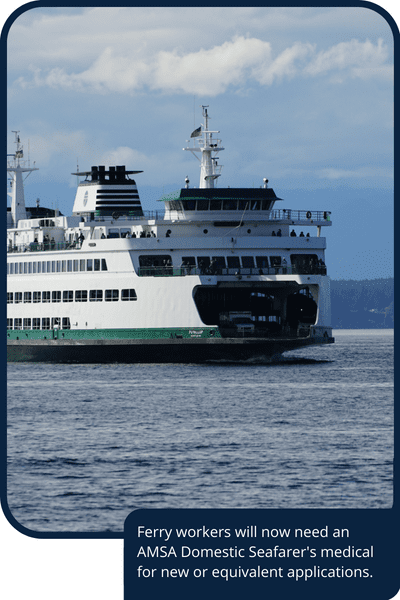Changes to AMSA’s Domestic Seafarer Medical Fitness Certification explained
From 1 January 2023, a number of changes came into effect for the Australian Maritime Safety Authority’s (AMSA) Domestic Seafarer Medical Fitness Certification requirements and assessment standards for domestic seafarers. This is what employers and employees need to know.
What are the changes?
AMSA has made changes to the requirements and assessment standards for the Domestic Seafarer Certificate of Medical Fitness to recognise the difference in duties and conditions faced by domestic and international seafarers. While some domestic seafarers may work offshore at the edges of Australian waters, others may be working on ferries in major capital cities on calm waters close to medical care.
As of 1 January 2023, Domestic Seafarers (those working in Australian near-coastal waters up to 200 nautical miles off the coast), must hold a Certificate of Medical Fitness in these circumstances:
- For all new and equivalent applications
- At initial issue of a near coastal certificate of competency
- At the time of renewal of high complexity certificates of competency*
*A self-declaration is sufficient for the renewal of low complexity certificates of competencies.
KINNECT’s Chief Medical Officer, Dr David Parker welcomed the changes: “The new detailed standards give medical practitioners more scope to consider the specific risks and requirements of each domestic seafaring job. We’re happy to see that the changes also allow for a greater number of qualified providers, like KINNECT, to conduct Domestic Seafarer medicals to meet the demand that the increased requirements will bring.”
Changes to the assessment standards
The standards offer more detailed explanation of the medical fitness requirements of working at sea and have been based on the international requirements for the Standards of Training, Certification and Watchkeeping (STCW) code and convention that is used for foreign-going seafarers.
They provide information and guidelines for medical conditions which may affect people’s fitness to work at sea and encompass:
- Body morphology

- Visual acuity, colour vision and monocular vision
- Hearing, ear, nose and throat conditions
- Cardiovascular health
- Respiratory conditions
- Gastrointestinal health (including teeth and gums)
- Genitourinary health (including pregnancy)
- Neurological conditions
- Psychiatric conditions
- Prescribed medication, drugs and alcohol consumption
- Musculoskeletal health, balance and coordination
- Diabetes and other endocrine disorders
- Skin disorders
- Haemopoietic disease
- Infection diseases
- Neoplasms
- Considerations relating to age (for older seafarers)
The standards don’t cover every clinical situation and job, so judgement is required by the medical practitioner to ensure the primary objective of maintaining safety at sea is met. AMSA has helpfully provided job task analyses to guide practitioners.
An employing company can require staff to meet more stringent standards in addition to those set by AMSA to take into account the conditions or risks posed by specific jobs and equipment. These can be developed by their own occupational physician and a supplementary report requested from the assessing medical practitioner.
Components of the Domestic Seafarers medical include:
- Audiometry
- Medical Examination with Doctor including height, weight, BMI, BP, pulse etc.
- Medical History
- Spirometry
- Urinalysis
- Vision testing
Applicants over 55 are also required to have a Montreal Cognitive Assessment (MOCA).
Certain roles and situations may call for additional components to fulfil the requirements of the certificate:
- Hepatitis A serology and vaccination for certain roles e.g., engineer and catering staff
- Chest x-ray (only when clinically indicated by doctor)
Applicants for the medical will be deemed either fit for intended duties at sea, fit with restrictions or unfit.
Read more about the changes to medical fitness and access the full standard documents here.
Why is medical fitness so important for domestic seafarers?
Seafarers working at the edges of Australia’s domestic waters are unable to access medical care beyond basic first aid. This distance also makes it difficult to evacuate a seafarer to a medical facility and replace them. Vessels often work with the minimum number of people required, so even one seafarer becoming incapacitated can place a burden on all other workers or lead to a reduction in operations.
“The medical assesses a seafarer’s fitness to withstand the rigors of a volatile work environment and physically demanding job. We also check for medical conditions that could impinge on their own or other’s ability to work safely and effectively, spread – in the case of contagious diseases – or become worse as a result of a seafaring job,” Dr Parker explained.
KINNECT is proud to offer medicals for the Domestic Seafarer Certificate of Medical Fitness as part of our Pre-Employment Assessments service.
KINNECT offers medicals for the Domestic Seafarer Certificate of Medical Fitness as part of our Pre-Employment Assessments service. For more information, contact us online, or call our team today on 1300 546 632. Alternatively, you can book and pay online now.



